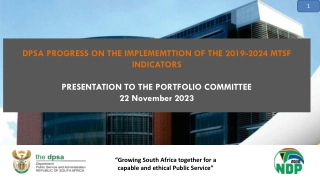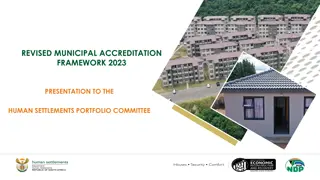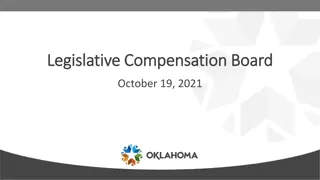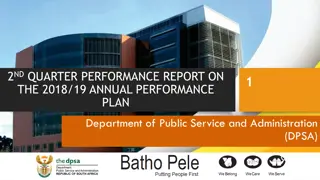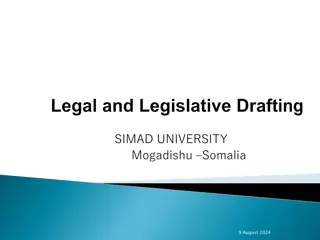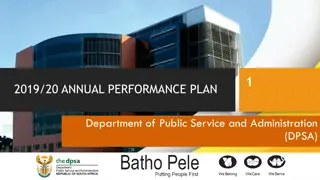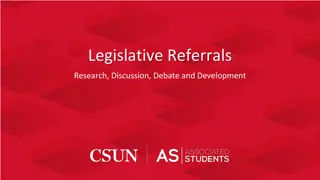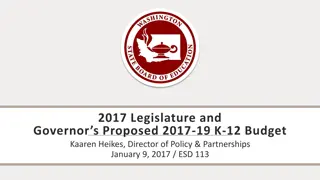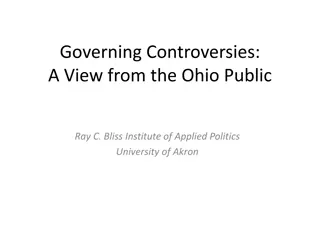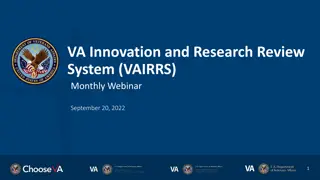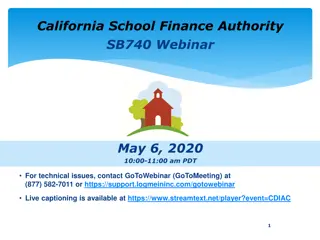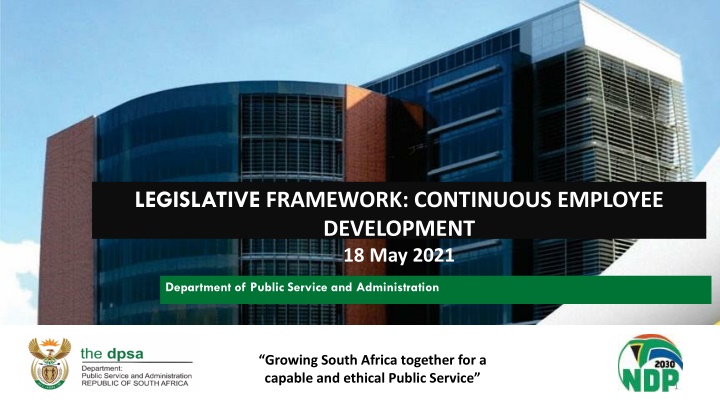
Continuous Employee Development: Legislative Framework and Application
"Explore the legislative framework surrounding continuous employee development in South Africa's Public Service. Discover the importance of professional training, relevant legislation, and the role of the employer in supporting skill enhancement. Join the movement towards a capable and ethical Public Service."
Download Presentation

Please find below an Image/Link to download the presentation.
The content on the website is provided AS IS for your information and personal use only. It may not be sold, licensed, or shared on other websites without obtaining consent from the author. If you encounter any issues during the download, it is possible that the publisher has removed the file from their server.
You are allowed to download the files provided on this website for personal or commercial use, subject to the condition that they are used lawfully. All files are the property of their respective owners.
The content on the website is provided AS IS for your information and personal use only. It may not be sold, licensed, or shared on other websites without obtaining consent from the author.
E N D
Presentation Transcript
LEGISLATIVE FRAMEWORK: CONTINUOUS EMPLOYEE DEVELOPMENT 18 May 2021 Department of Public Service and Administration Growing South Africa together for a capable and ethical Public Service 1
Presentation Outline 2 Introduction Relevant legislation Application within the Public Service Conclusion Growing South Africa together for a capable and ethical Public Service
Introduction 3 Continuous employee development is the process whereby employees go through professional training to improve their skills and grow their knowledge, with the support of their employer. The support of the employer can be through allowing time for studying, attending development courses, seminars, conferences or other related development interventions. The above development interventions can be self-funded, or paid for by the employer. Continuous employee development is required to acquire skills and knowledge to successfully adapt to changing work and life demands. The development intervention can either be formal or informal. Growing South Africa together for a capable and ethical Public Service
Relevant Legislative Framework 4 Constitution of RSA, 1996 Public Service Act, 1994 as amended by Act 30 of 2007 The South African Qualifications Authority Act (1995) The White Paper- Public Service Education & Training (1997) The White Paper- PS-HRM Transformation The Skills Development Act (1998) Skills Development Act, 1998 Employment Equity Act, 1998 White Paper on Training and Development in the Public Service, 1998 Government Economic Transformation Policies Growing South Africa together for a capable and ethical Public Service
Relevant Legislative Framework 5 Skills Development Levies Act, 1999 Senior Management Service Handbook, 2003 Human Resource Development Strategic Framework,2007 Leadership Development Management Strategic Framework, 2007 Policy on the Utilisation of Training Budgets, 2011 Policy on e-learning, 2011 Competency Framework for SMS as issued in April 2011 Revolving Door Policy Performance Management and Development System for SMS, amended 2006. Public Service Regulations, 2016 Growing South Africa together for a capable and ethical Public Service
Legislative Framework 6 Departmental Policies Directives & Determinations Public Service Human Resource Development Strategic Framework Various Acts on employee development Constitution Growing South Africa together for a capable and ethical Public Service
Public Service Journey 7 Pre - 1994 1994 - 2000 2002 - 2020 Human Resource Development Strategy I (2002 2006) PS HRD Strategic Framework: Vision 2015 (2007-2015) Revised Public Service Human Resource Development Strategic Framework 2020 towards and beyond the NDP 2030 (Draft) Separate & Fragmented Approaches to HRD (Specific focus on employee development) South African Constitution S195 (1996) The Public Service Act (1994) The South African Qualifications Authority Act (1995) The WP- PS-HRM Transformation (1995) The WP- Public Service Education & Training (1997) The Skills Development Act (1998) The Employment Equity Act (1998) Economic Growth Transformation Policies transformation (development focus) Public Service Human Resource Pre-Democratic Dispensation Laying the legal foundation for Development Strategies (Apartheid South Africa, multiple Bantustans/TBVC States and self- determination States) Growing South Africa together for a capable and ethical Public Service
The Constitution 8 Section 195 (1)(h) Good human-resource management and career-development practices, to maximise human potential, must be cultivated. The above suggests that there is a need to have a dedicated focus on ensuring employee development in order to capacitate them for achievement of results and career development. Growing South Africa together for a capable and ethical Public Service
9 Public Service Act, 1994 & Public Service Regulations, 2016 Chapter 1 (Definitions)- reference to employment practices, includes training and development. Section 4 : Training Institution, was repealed and replaced by Section 11 PAMA, (2014). PS Regulation 74: Institutional Arrangement regarding Education, Training and Development PS Regulation 75: Training Directed by the Minister PS Regulation 76: Occupational Specific Competencies and Training PS Regulation 77: Training Assistance PS Regulation 90: SMS Training and Development Growing South Africa together for a capable and ethical Public Service
Skills Development Act 97 of 1998 To provide an institutional framework to devise and implement national, sector and workplace strategies to develop and improve the skills of the South African work force; To integrate those strategies within the National Qualifications Framework contemplated in the South African Qualifications Authority Act, 1995; To provide for Iearnerships that lead to recognised occupational qualifications; To provide for the financing of skills development by means of a levy-grant scheme and a National Skills Fund. 10 Growing South Africa together for a capable and ethical Public Service
National Qualifications Framework Act, 2008 The objectives of the NQF are to- create a single integrated national framework for learning achievements; facilitate access to, and mobility and progression within education, training and career paths; enhance the quality of education and training; accelerate the redress of past unfair discrimination in education, training and employment opportunities. The objectives of the NQF are designed to contribute to the full personal development of each learner and the social and economic development of the nation at large. 11 Growing South Africa together for a capable and ethical Public Service
White Paper on Affirmative Action in the Public Service, 1998 Training and development programmes. Human resource development, including: Pre-entry training and development Induction and orientation training Range and content of formal training courses (internal and external), and opportunities and selection for such courses Opportunities and support for further education for career- enhancing qualifications On-the-job training Mentoring and coaching schemes 12 Growing South Africa together for a capable and ethical Public Service
White Paper on Human Resource Management in the Public Service 13 Effective career management: Enables employees to maximise their career potential by availing themselves for job opportunities, training and development. Enables employers to develop the organisation's human resource capacity while supporting, as far as possible, employees' career aspirations Growing South Africa together for a capable and ethical Public Service
14 White Paper on Public Service Training and Education The principal aim is to establish a clear vision and policy framework to guide the introduction and implementation of new policies, procedures and legislation aimed at transforming public service training and education into a dynamic, needs-based and pro-active instrument, capable of playing an integral and strategic part in the processes of building a new public service for a new and democratic society in South Africa. Public service training and development will be founded on the following vision: To contribute towards the development of a dedicated, productive and people- centred public service staffed by public servants whose performance is maximised and whose potential is fully developed through the comprehensive provision of appropriate, adequate and accessible training and education at all levels. Growing South Africa together for a capable and ethical Public Service
15 White Paper on Transforming Public Service Delivery Reference to departmental service delivery strategies which are needed to promote continuous improvements in the quantity, quality and equity of service provision. These strategies put emphasis on human resource development and organisational capacity. Service delivery and customer care must be included in all training programmes, and additional training should be given to all those who deal directly with the public, whether face-to-face, in writing or on the telephone. Growing South Africa together for a capable and ethical Public Service
16 Strategies/ Frameworks Human Resource Development Strategy for South Africa The aim of the strategy is to maximise the potential of the people of South Africa, through the acquisition of knowledge and skills, to work productively and competitively in order to achieve quality of life for all. Human Resource Development Strategy, Vision 2015 The aim of the Strategic framework is to provide guidance on the development of employees in the Public Service. Leadership Development Management Strategic Framework, 2007 Growing South Africa together for a capable and ethical Public Service
Directives and Determinations 17 Senior Management Service Handbook, 2003 Performance Management and Development System for SMS, amended 2006. Directive on compulsory capacity development, mandatory training days and minimum entry requirements for SMS. Directive on utilisation of training budgets. Directive on mandatory training programmes (draft) Growing South Africa together for a capable and ethical Public Service
Conclusion 18 Continuing employee education serves as an engine to the delivery of services since it enables public servants to keep up to date with relevant knowledge and skills required as they execute their duties to serve the citizenry. The Public Service needs to invest on continuous development for all employees. Departments need to ensure that they follow the legislative requirements as foundation to train and develop/ capacitate their employees on a regular basis. Growing South Africa together for a capable and ethical Public Service
THANK YOU 19

